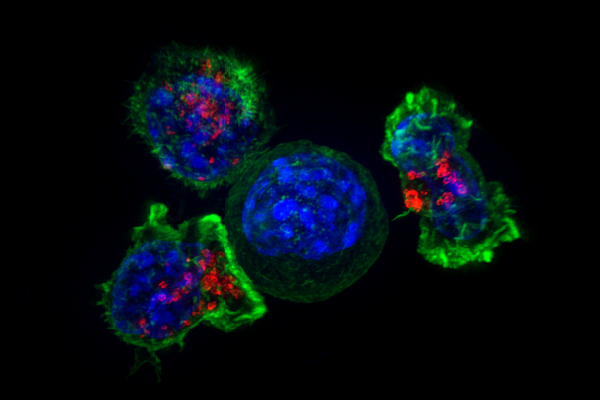Genomic analysis is important even for ultra-hypermutated tumors prior to immune therapy

New research from The Ohio State University Comprehensive Cancer Center – Arthur G. James Cancer Hospital and Richard J. Solove Research Institute (OSUCCC-James) underscores the importance of genomic analysis of rare malignant tumors that are genetically unstable and have high numbers of gene mutations.
OSUCCC-James investigators analyzed the cancer genomes of nine metastatic tumors and the pretreatment primary tumor from a deceased patient with a rare form of cancer called interdigitating dendritic cell sarcoma. The disease has no standardized treatment.
The samples were obtained through a body donation and autopsy study. The autopsy was carried out within three hours of death, minimizing post-mortem molecular changes.
The analysis revealed that all the tumors were ultra-hypermutated. That is, the cancer cells had more than 100 gene mutations per million DNA bases. Ultra-hypermutated cancers often respond to immune therapy, but this patient's cancer continued to progress in spite of two courses of immune therapy and targeted agents.
In addition, the researchers identified six subpopulations of malignant cells in the tumor samples and the presence of three mutational signatures. They also classified the genetic alterations into those present in all, in some or in individual tumors. These included point mutations in tumor-suppressor genes and probable driver mutations in oncogenes.
The findings are published in the journal Oncotarget.
"This study illustrates how a special partnership with patients can enable study of aggressive rare cancers," says principal investigator and corresponding author Sameek Roychowdhury, MD, Ph.D., associate professor of medical oncology, precision cancer medicine and genomics. "Our hope is that with continued growth, this study will enable us to describe a complex landscape of cancer and develop new therapies based on this work. We have made this promise to our patients and their families.
"The findings have important clinical implications," Roychowdhury adds. "Patients with cancers that show ultra-hypermutation often benefit from immunotherapy, but our study indicates that research is still needed to determine which type of immunotherapy is best for each individual patient."
For this study, 24 metastatic-tumor samples were collected from affected organs. Computed tomography (CT) scans taken prior to the patient's death guided procurement of tumor samples. Whole exome sequencing was performed on nine of the samples, plus the pretreatment sample.
All 10 tumor sites showed ultra-hypermutation rates. Other key findings included:
- Over 7,400 somatic variants identified in all 10 samples were classified into three categories: detected in all tumor samples, detected in subsets of samples and private variants unique to one tumor sample.
- A tumor evolutionary tree was constructed demonstrating diversity of the tumor cells.
The molecule results from this patient's autopsy are among the first to be published from the Body Donation for Cancer Research Study at the OSUCCC – James. The study is active and accepting patient referrals. The goal is to better understand aggressive, treatment-resistant cancers.
"Body donation provides us with an unprecedented ability to study cancer biology," says Hui-Zi Chen, MD, Ph.D., a senior medical oncology fellow who started the study with Roychowdhury. "Beyond that, I feel privileged and honored to care for our patients after death, and those of us conducting the study are committed to learning all we can from their special gift and to helping others."
More information: Hui-Zi Chen et al. Genomic characterization of metastatic ultra-hypermutated interdigitating dendritic cell sarcoma through rapid research autopsy, Oncotarget (2019). DOI: 10.18632/oncotarget.26352

















